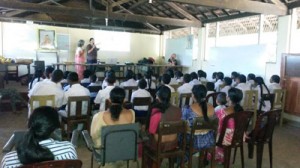Talking to children about the ABCs of sex

Dr. Hulse talks to students and teachers in a school in Kandy
Dr. Elspeth Hulse from the University of Edinburgh spent a number of weeks in December and January, volunteering at general and sexual health education talks with schoolchildren and at factories in Kandy, Nuwara Eliya and Kurunegala. Here MediScene asks her some all important questions about what parents should be telling their kids about sex.
How much should children know about sex, and when?
This is a difficult question, and different countries/governments and religions will have different answers. Children should probably know what the process of sex is by age 11. This does not have to be discussed in graphic detail, but the biology of what parts of the body are involved and how a baby is made should be explained simply. Later on they should learn about contraception in more detail to avoid the high rates of non-legal abortions that occur in Sri Lanka and that contributes to the high maternal death rate.
Is it better to wait for them to ask? Or for parents to open the discussion themselves?
If they have not asked by age 12-13, parents should open discussion themselves and find out what they know. This will give you a good starting point to open discussions about sexual health.Often what they know will be incorrect information they have got online and from their peers.
Will talking to them about sex encourage them to try things out and make things worse?
Recent research done in Ireland has shown that giving information actually seems to postpone first sexual activity, with less risky behaviour. It would seem far better that a child know about sex and contraception (basics) than be faced with a daughter sharing the news that she is pregnant, or worse, that she has had an abortion before talking to a parent first.
What is the most important information to communicate to children about sex?
It is important to stress that this is meant to be a physical act of love between two grown up individuals in a long-term loving, respectful relationship, and that it should never be taken lightly because the end result could be pregnancy and the need to look after a new baby. Another point to stress is that sex is not to be forced upon a woman or man. It is not a male right, and you should always ask the other person before agreeing to sex. Some important messages would also include that sex as portrayed in the pornography industry is not real, and that women don’t really act like that. That it is never ok to have sex with a child and is in fact illegal.
 Will sharing parents’ experiences lower children’s respect for them as parents?
Will sharing parents’ experiences lower children’s respect for them as parents?
I do not think so. I think it will make them respect them more, but I would stress that these are private details that you would not wish to be shared with their peers. You can give an overall impression without giving all the details.
How does one protect children from being sexually abused?
Educate them, talk about it with them. It does not have to be graphic – even just ‘good touch, bad touch’.
‘Good touch – Bad touch’ is a child abuse prevention campaign led by the National Child Protection Authority. From a very young age, children can be encouraged to identify what sort of physical contact is ok, what is not, and what is questionable. Children of 4 years or older can be educated that touching in the private places is not right, and that they should tell the person ‘no’ and to inform a responsible adult/teacher/police officer.
n In cases of abuse, most kids are abused by someone close to them, how should one prepare children against it?
Data shows that 90% of child abuse happens by someone that is known by the child – this is really distressing to a parent. The best thing you can do is teach your child the ‘good touch, bad touch’ and listen to your child if they have any complaints – they may not be making it up just because they do not like Auntie X or Uncle Y. If the child is acting strangely, question them about it.
What advice should be given on behaving with strangers?
Historically children have been told not speak to strangers, not to go off with strangers and not to take gifts/sweets from strangers which is all good. Having said that, children have a natural suspicion of strangers and we should encourage them to keep this natural instinct.
What should one do when children have been discussing sex with their friends, in school?
Speak with them privately about what they have been discussing and then teach them the basics yourself so you know that they know your view and understanding of sex. There are many good books and aids out there which can be useful in teaching about sex and contraception.
How can parents help children identify friends who may lead them to do “bad”?
Teenagers will always be interested in sex, and the parent has a key role in educating them about sex and what is acceptable and non-acceptable behaviour. Teachers can only do so much and we should not rely on them. As a parent, you have a huge influence on: what your child says, learns, watches on TV and how they act, and so you can pre-empt any unwanted behaviour or poor learning about sex by instructing them yourself with the appropriate tools and teaching aids.


